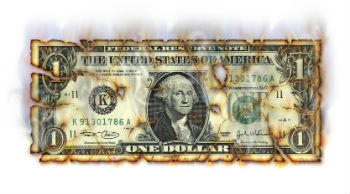Know Your Burn Rate? Your Bookkeeper Can Tell You
 What’s your burn rate? Not calories per hour, we’re talking dollars per month. Dollars per month you small business goes through to stay functional. Business owners need to know what it takes to keep the lights on, door open, website up, and phones ringing every month. Not knowing this is the same are driving at night with the headlights off, you are setting yourself up for an accident.
What’s your burn rate? Not calories per hour, we’re talking dollars per month. Dollars per month you small business goes through to stay functional. Business owners need to know what it takes to keep the lights on, door open, website up, and phones ringing every month. Not knowing this is the same are driving at night with the headlights off, you are setting yourself up for an accident.
Calculating Your Burn Rate
Sure some months are slow and some are red hot, but when you average it all out, what are your dead certain monthly costs? These are called your FIXED COSTS. Think rent, utilities, subscriptions, monthly services; lease payments; insurance; and anything else that will shut you down if you fall behind in those monthly checks. Then you have to figure in minimum payroll (gross wages/salaries, payroll tax expense, benefits, etc.).
I prefer to use a Profit & Loss Report to help me identify my average minimum monthly fixed rates (=burn rate). Starting from within QuickBooks, set up a Profit and Loss Report spanning least a six-month period. Export this to Excel. In excel you can highlight the rows that relate to your “Fixed Costs”. By dividing your totals in the far right column by 6 (or the amount of months the report spans), you will have what you are making, on average, in each income row, what you are spending to make those sales, on average, in each COGS row, and what your average costs per month for your fixed costs are.
But be careful, not all expenses below the COGS are fixed costs. Just select the bare necessities like rent, lease payments; insurance, and utilities and any services you pay for on a month-to-month basis (like web hosting if you have a lot of internet customers). There will be some “discretionary spending” left over. That will be your advertising, office supplies, meals and entertainment, etc. Those things usually get skipped during the lean times of the year. They are not mission-critical to keeping you afloat; so for now don’t include them.
To figure out your minimum payroll cost per month you need to decide how many and which employees are mission-critical to your business. (Hint: this probably includes you.) Figure out what their average monthly cost would be (to figure out how much you pay in payroll taxes figure about 6.5% on top of their gross wages/salaries.) Their health benefits and WC insurance can be figured out too by getting rough averages for these expenses. You don’t need to be exact, just getting it close is good enough.
Utilize The Results
Add it all up. And then breathe. The first time you go through this it can be a bit overwhelming. Whether or not you know what your burn rate, you do have one, so it is better to know it. Every month you need to have sufficient funds to cover these basic costs. Again you have to look at a 6 or even 12 month average because to smooth out the peaks and valleys.
If you are just starting out, you won’t have a running average, you will just have a list of costs that you are committed to covering. You need enough money to cover these costs while you’re waiting for the sales to pick up, or its curtains for you. Your burn rate will tell you how long your cash will last and how soon you will need more cash either in terms of sales or fresh capital investment. In either case to it is better to know concretely than to have just a vague sense of dread.
Photo Credit © Dollar Photo Club / jimlarkin


Comments